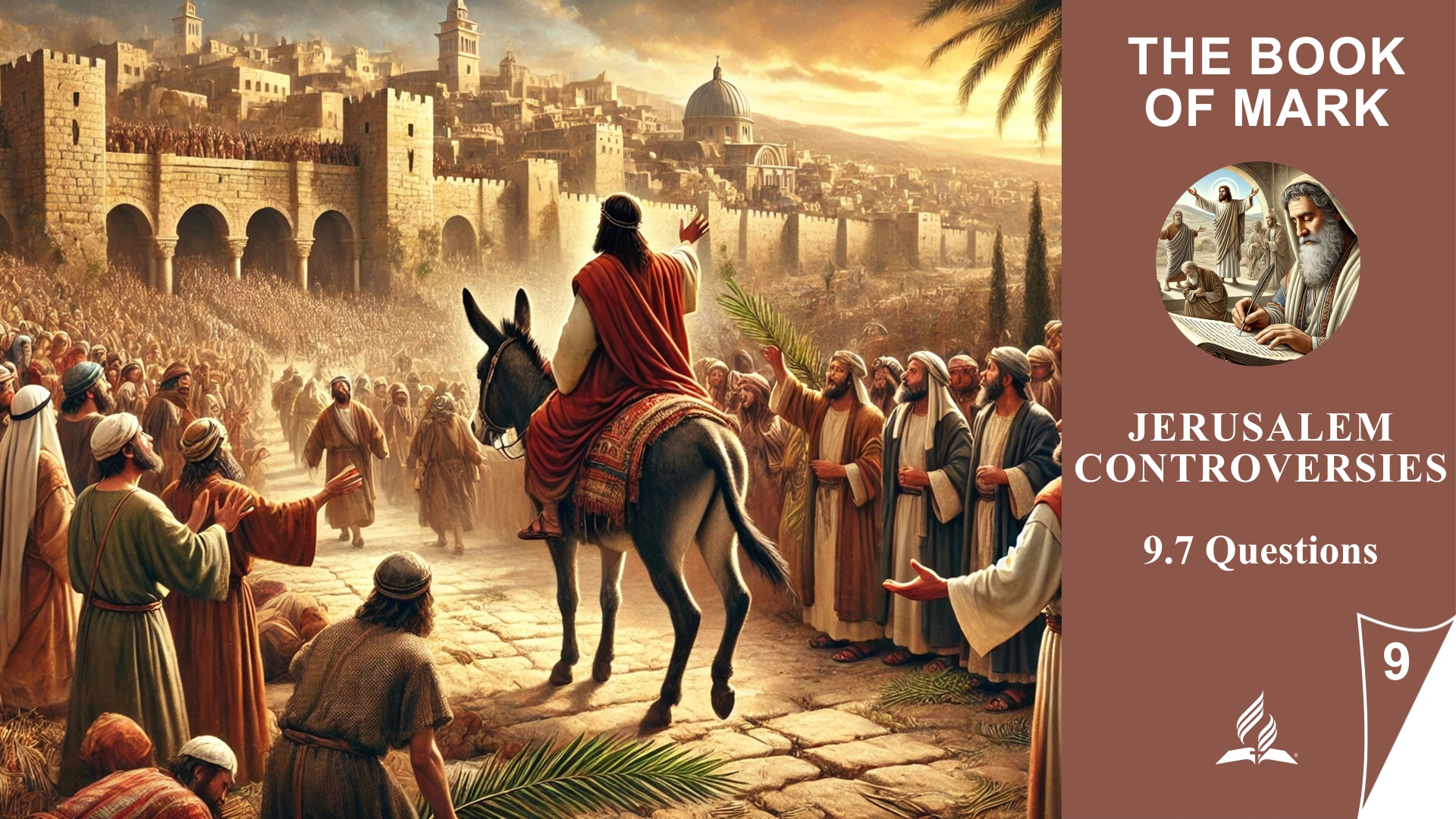



9.7 Questions
1.Reflect on the significance of Jesus cleansing the temple. How could this principle be applied to our church today? How should such a cleansing take place?
The cleansing of the temple by Jesus is a powerful symbol of restoring holiness and purity in worship and the faith community. This event shows that Jesus had a zeal for His Father’s house and would not tolerate the desecration of the sacred space or the true purpose of worship by worldly or corrupt practices.
Application to the Church Today:
-
Restoration of Focus on the Essentials: In today’s church, “cleansing the temple” means refocusing on what faith is truly about—worshiping God, proclaiming His Word, and fostering Christian fellowship. Any practices that dilute this focus or turn the church into a venue for economic or political interests should be reconsidered and removed.
-
Examination of Hearts and Motivations: Such cleansing starts with the hearts of the believers. It’s essential to examine our own motives and actions to ensure they align with Christ’s teachings. The church, as a community, should regularly reflect on its mission and practices to ensure they honor God and serve people.
How Should Such a Cleansing Take Place?
-
Prayer and Repentance: The first step to genuine cleansing is prayer for God’s guidance and acknowledging our own faults and sins. Repentance involves turning away from wrong ways and striving to follow God’s will.
-
Return to Biblical Teachings: The church should base its teachings and practices on the Bible. All activities and programs should be grounded in biblical principles and aim to draw people closer to God.
-
Encouragement of Personal Holiness: A cleansed church consists of cleansed individuals. Members should be encouraged to live lives of personal holiness that reflect God’s love, grace, and purity.
-
Transparency and Accountability: In practical matters like finances, leadership, and decision-making, the church should be transparent and accountable to prevent abuse and corruption.
The cleansing of the temple reminds us that the church is a sacred space dedicated solely to God. Such cleansing requires courage, determination, and a firm belief that God deserves the honor and worship that is rightfully His.
2.In the Gospels, Jesus frequently refers to the Holy Scriptures and their fulfillment. What does this tell us about their central importance in the faith? Why must we firmly reject any attempt to undermine the authority of the Holy Scriptures, particularly the idea that the Scriptures are merely human notions of God, of what God is like, and how He acts?
Jesus’ repeated references to the Holy Scriptures in the Gospels underscore their central importance in the faith. Jesus not only quoted Scripture to support His teachings but also fulfilled Old Testament prophecies, demonstrating that the Scriptures possess divine authority and continuity. This reveals several important aspects of the role of the Holy Scriptures in the faith:
-
The Holy Scriptures as God’s Revelation: The Bible is not merely a historical or moral document but the revelation of God Himself. It contains God’s Word, revealing His will, character, and plans for humanity. Jesus regarded the Scriptures as authoritative and taught that they must be fulfilled because they are the immutable Word of God.
-
The Holy Scriptures as the Foundation of Faith: For Jesus and the early church, Scripture was the basis for teaching, correction, and spiritual life. It serves as a guide for faith and conduct, offering direction in all areas of life.
-
The Immutability of Scripture: Since the Holy Scriptures are God’s Word, they are eternal and unchangeable. Jesus emphasized that not a single letter of Scripture will pass away until all is fulfilled (Matthew 5:18). This highlights the Bible’s permanence and ongoing relevance for all generations.
Why Must We Firmly Reject Any Attempt to Undermine the Authority of the Holy Scriptures?
-
Protection of Truth: Questioning the authority of the Scriptures or viewing them merely as human interpretations of God opens the door to subjective interpretations that can dilute or distort the true message of God. This leads to confusion and error, undermining the unity and integrity of the faith.
-
Loss of Divine Authority: If the Scriptures are seen as just human works, they lose their divine authority. This would undermine the foundation of faith, as the Scriptures would no longer be recognized as the final and binding revelation of God. Faith would then rest on human opinions and views rather than the infallible Word of God.
-
Defense of Faith: The Holy Scriptures are the central tool for defending the Christian faith against false teachings and errors. Undermining their authority weakens Christians’ ability to uphold and proclaim the truth of the Gospel.
Conclusion: The Holy Scriptures are more than just a book; they are the living revelation of God and the foundation of the Christian faith. Any attempt to diminish their authority is a threat to the understanding and practice of the faith. Therefore, we must uphold and firmly defend the divine inspiration and authority of the Scriptures.
3.What is the appropriate boundary between church and state? How is what Jesus taught in Mark 12:13-17 a guideline for this discussion?
In Mark 12:13-17, Jesus is confronted by the Pharisees and Herodians with a question about paying taxes to the Roman Emperor. They ask Him if it is lawful to pay taxes, hoping His answer will get Him into trouble with either the people or the Roman authorities. Jesus wisely replies, “Give to Caesar what is Caesar’s, and to God what is God’s.” This answer provides valuable guidance for the discussion about the appropriate boundary between church and state.
-
Distinction Between Secular and Spiritual Responsibilities: Jesus’ response shows that there is a clear distinction between duties to secular authorities and duties to God. The state has the right to levy taxes and enact laws that govern public life. At the same time, our highest loyalty and obedience belong to God, especially in spiritual and moral matters.
-
Acknowledgment of the State’s Legitimate Authority: Jesus affirms that secular authorities have a legitimate role that should be respected. Christians have the responsibility to be good citizens by following laws, paying taxes, and contributing to society, as long as these requirements do not conflict with God’s commands.
-
Priority of Divine Command: While Christians should fulfill their secular duties, Jesus also makes it clear that God’s commands and claims on our lives always take precedence. If the state demands something that goes against God’s commands, we must obey God rather than men (Acts 5:29). This shows that the church must maintain its spiritual authority and commitment to God, independent of the state.
Appropriate Boundaries Between Church and State:
-
Autonomy in Spiritual Matters: The church should operate independently in spiritual, moral, and religious matters. The state should not interfere with the church’s teachings, practices, or mission.
-
Cooperation on Social and Ethical Issues: There are areas where the church and state can collaborate to promote the common good, such as social services, education, or ethical issues. This cooperation should always respect the church’s independence in its spiritual beliefs.
-
Limits to State Power: The state should not attempt to control or suppress the conscience or religious beliefs of its citizens. Protecting religious freedom is essential for a healthy relationship between church and state.
Conclusion: Jesus’ teaching in Mark 12:13-17 offers a balanced perspective, emphasizing the necessary separation and interplay between church and state. Christians are called to fulfill their secular responsibilities while maintaining their primary loyalty to God and the commands of Scripture. The church must preserve its independence in spiritual matters, while the state exercises its role in maintaining order and justice.
4.Examine texts that discuss the resurrection. Why is this teaching so central to our faith, especially regarding the state of the dead?
The doctrine of the resurrection is one of the most central and foundational beliefs in Christianity. It is discussed in many biblical texts, particularly in the New Testament. For instance, 1 Corinthians 15:12-22 emphasizes the significance of the resurrection for the Christian faith.
Why is this Teaching Central?
-
Confirmation of Victory Over Death: The resurrection of Jesus from the dead is the definitive proof that death has been defeated. Death is not the end, but through Christ, death has been overcome, and eternal life is possible. Without the resurrection, death would remain an undefeated enemy, and faith in Christ would be in vain (1 Corinthians 15:14).
-
Hope of Eternal Life: The resurrection provides believers with hope for their own life after death. Through Jesus’ resurrection, we have the assurance that we too will be resurrected when He returns (1 Thessalonians 4:14). This hope of new, imperishable life is a central source of strength and comfort in the Christian faith.
-
Connection to Forgiveness of Sins: The resurrection is closely linked to the forgiveness of sins. Through Jesus’ death and resurrection, the power of sin was broken, and believers can live a new life in Christ. Without the resurrection, forgiveness would be incomplete, as death would still be the ultimate consequence of sin (Romans 4:25).
-
Sign of the New Creation: The resurrection marks the beginning of the new creation that God initiates through Christ. It points to the future restoration of all things when God’s kingdom is fully established. This gives believers a vision of the future where all things are made new (Revelation 21:1-4).
Regarding the State of the Dead: The doctrine of the resurrection provides a clear answer to the fate of the dead. In Christian belief, death is not seen as a final end but as a state of waiting for the resurrection. Those who have died in Christ will rise to enjoy eternal life in God’s presence. Without the hope of resurrection, death would be a final loss, but with this hope, death becomes a transition to eternal life.
Summary: The resurrection is central to Christian faith because it promises eternal life, signifies the defeat of death and sin, and ushers in the new creation. It reassures believers about the ultimate fate of the dead, transforming the concept of death from finality to a hopeful anticipation of eternal life.
(Visited 6 times, 1 visits today)




















